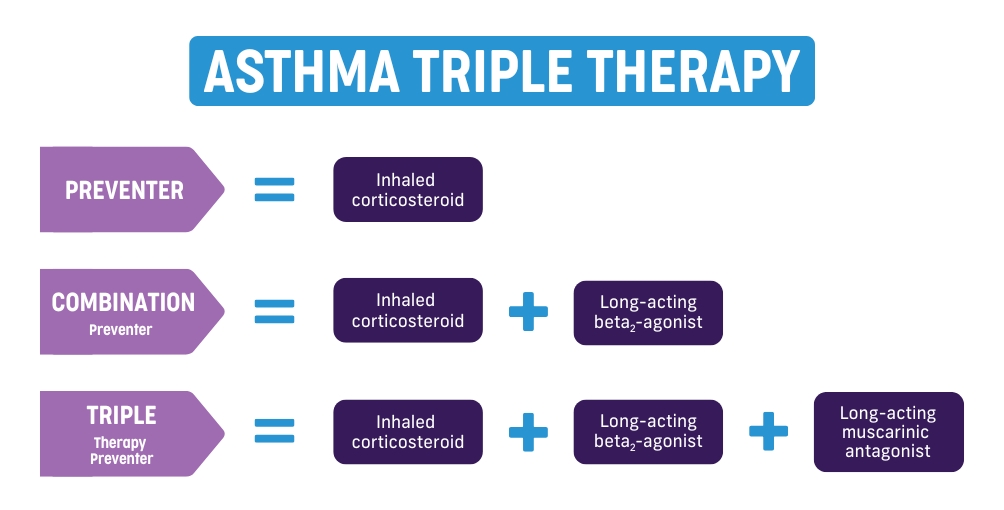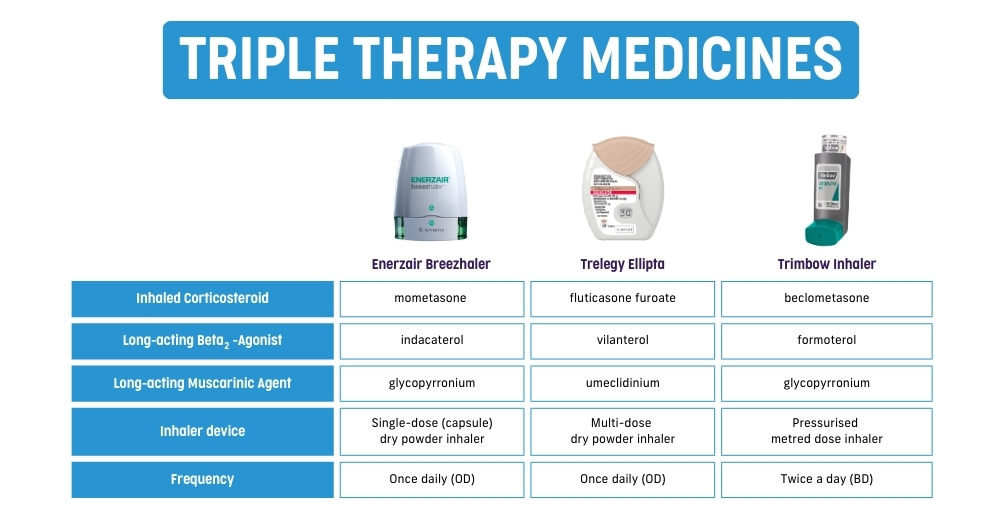Triple Therapy Preventers
For most people with asthma, preventers are part of everyday life.
Preventer medicines are the key to staying well with asthma. They are prescribed to be taken regularly to maintain your asthma control. Preventer medicines take two to four weeks (or longer) before they reach their full effect, so are not prescribed for short-term use. Most asthma preventers are inhaled corticosteroids.
Reliever medicines act quickly to relax the tight muscles around the airways. They are the key medicine to treat symptoms during an asthma attack or flare-up. Relievers like salbutamol or terbutaline are called ‘short-acting beta2-agonists’ or SABAs for short.
But what do you do if you are using your asthma medicine as prescribed, and still getting frequent symptoms? Talk to your doctor about what you could do to improve your asthma control.
Many new medicines have been approved for asthma over the past few years. Some of these options are triple therapy inhalers.
WHAT IS TRIPLE THERAPY?
As the name suggests, triple therapies contain three medicines in one inhaler.
- An inhaled corticosteroid (ICS) to reduce inflammation
- A long-acting beta2-agonist (LABA) to open airways
- A long-acting muscarinic antagonist (LAMA). LAMAs work by relaxing the airway muscles using a different pathway, providing an extra layer of treatment action
This may also be called Single Inhaler Triple Therapy or SITT.

See preventers and combination preventers to learn more about inhaled corticosteroids and LABAs.
WHO IS TRIPLE THERAPY FOR?
Triple therapy isn’t for everyone with asthma. The goal of asthma treatment is to get the most benefit from the least medicine, so your doctor won’t prescribe a triple therapy unless it’s the best option for you.
Triple therapies may be prescribed for people with uncontrolled asthma, who have:
- Had a serious flareup in the last 12 months which required treatment with oral steroids
- Are using a medium-high dose combination preventer daily as prescribed
- Have had their device technique assessed
If you’re struggling to control your asthma, talk to your doctor. They can assess your asthma severity and determine which therapy might be a good option for you.
If you already use a combination preventer plus an add-on inhaled medicine, your doctor may prescribe a 3-in-1 triple therapy, to combine these into one inhaler. This may also be more cost-effective, depending on your dose and use patterns.
Side effects from triple therapy may be similar to those experienced when using other preventers. If you have problems with your inhaler, please talk to your doctor about changing to a different product.
Remember, the information online doesn’t replace professional medical advice. It’s crucial to consult your doctor to discuss your specific situation and determine the best course of treatment for your asthma.
WHAT MEDICINES ARE IN TRIPLE THERAPIES?
Enerzair Breezhaler, Trelegy Ellipta and Trimbow pMDI are the three triple therapies currently available for people with asthma in Australia. They each contain a different combination of the three types of medicines.
- Enerzair: (mometasone furoate/indacaterol/glycopyrronium)
- Trelegy: (fluticasone furoate/vilanterol/umeclidinium)
- Trimbow: (beclometasone/formoterol/glycopyrronium)

ARE THERE ANY SIDE EFFECTS?
All medicines can have side effects. If you do experience any side effects, most of them are minor and temporary. Read more about the medicines and side effects in the Consumer Medicine Information sheets below:
HOW TO USE TRIPLE THERAPY INHALERS
Each triple therapy comes in a different inhaler device, so talk to your doctor about which type you would find easiest to use.
Your doctor or pharmacist can provide in-person training on how to use your inhaler device and will likely be very pleased to demonstrate. This will ensure you are getting the best effect from any inhaler prescribed. You can also watch our technique videos below:
Information about medicines and devices to support people with asthma are developed independently by Asthma Australia, made possible by grant funding under the ‘Know Your Options’ Program from AstraZeneca, Chiesi Australia, Sanofi who are not involved in content development.
LEARN ABOUT OTHER ASTHMA PREVENTER MEDICINES
- Single Therapy Preventer
- Combination Preventers
- Non-Steroidal Preventers
- Dual Purpose Relievers
- MART: Maintenance and Reliever Therapy
Last updated: 13th November 2024





 1800 278 462
1800 278 462
